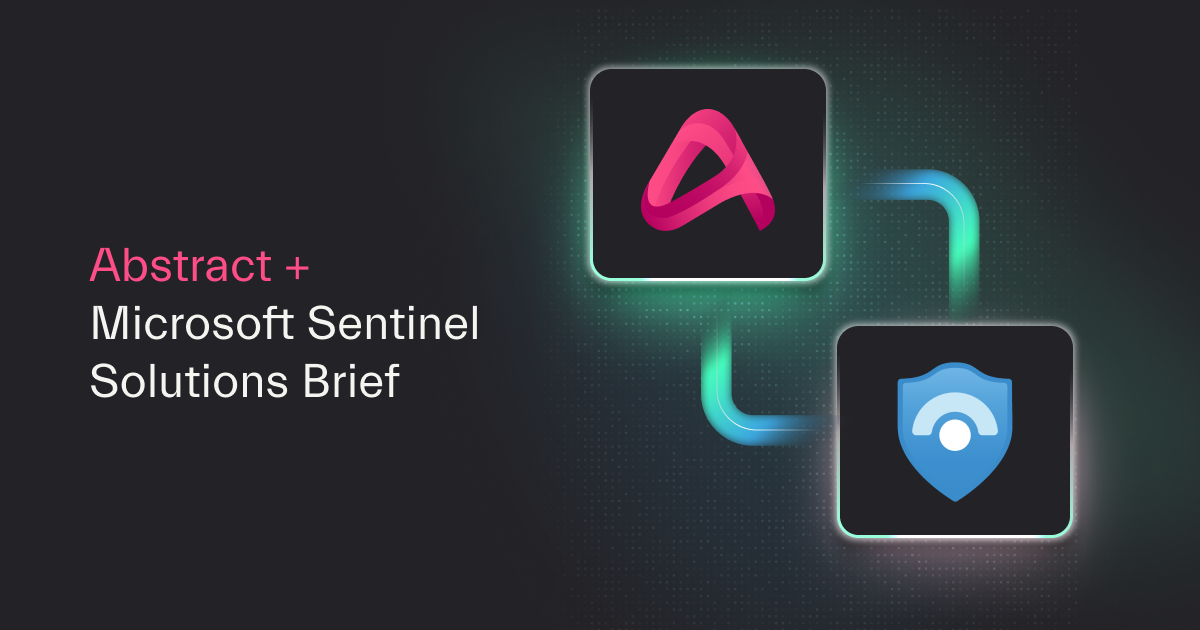Abstract + Microsoft Sentinel: Unlock Unlimited Real-Time Detections in Sentinel
Microsoft Sentinel delivers native visibility and analytics across the Microsoft cloud and Windows ecosystem, backed by powerful KQL and built-in threat intelligence. Abstract Security complements Sentinel with real-time streaming detections, cost-efficient data pipelines, and no-code integrations for SaaS and multi-cloud sources—helping teams maximize security outcomes while reducing operational overhead.

Top 3 reasons To Use Abstract With Microsoft Sentinel

Microsoft Sentinel ingests data through Azure-native connectors and requires individual Data Collection Rule configurations.

Abstract adds no-code SaaS, Syslog, and API integrations with global policies that eliminate manual scripting and maintenance.

Together: Security teams onboard diverse data sources quickly, without custom pipelines or extra overhead.

Microsoft Sentinel supports 512 scheduled rules and 50 near real-time rules, with batch latencies of 5–15 minutes.

Abstract enables thousands of streaming detection rules across SaaS, identity, and multi-cloud environments with sub-second latency.

Together: Teams detect threats earlier and at greater scale, improving response speed and coverage.

Microsoft Sentinel retains data in Azure storage tiers, but ingestion and retrieval costs can increase rapidly.

Abstract reduces data volumes by 60–80 percent before ingestion, applies checkpointing to prevent gaps, and offers cost-efficient retention options.

Together: Security teams cut costs while ensuring reliable access to the data they need.
Microsoft Sentinel + Abstract Security
Microsoft Sentinel delivers native visibility and analytics across Microsoft environments. Abstract Security extends this with cost-efficient pipelines, real-time detections, and simplified SaaS and multi-cloud integrations. Combined, they give security teams broader coverage, faster response, and lower costs.
Microsoft Sentinel is best for organizations with a strong Microsoft footprint, providing deep visibility into Microsoft 365, Azure, and Windows with powerful KQL analytics.
Abstract Security expands this reach with SaaS and multi-cloud integrations, real-time streaming detections, and cost-efficient pipelines. Together, they give teams broader coverage, faster insights, and more predictable costs.

Introducing Data Filtering Capabilities
Microsoft Sentinel recommends customers filter out irrelevant data before ingestion to reduce costs (Refr: Best practices for data collection – Microsoft), using Azure Monitor Agent or Logstash that support basic filtering capabilities.
Abstract’s Security Data Pipelines offer advanced, out-of-the-box, vendor-agnostic filtering capabilities through a simple drag-and-drop interface, with no KQL required.

Cost-Effective Data Ingestion
Optimized for non-Microsoft sources: Sentinel provides free ingestion for Microsoft Cloud data sources ingesting third-party data can get expensive. Abstract reduces data volume of popular integrations by as much as 60–80% before it hits Sentinel, lowering costs.

True Real-Time Detection
Abstract Security supports thousands of true real-time streaming rules, allowing teams to augment their Azure Sentinel detections for more flexible and immediate responses without eating into Azure Sentinel’s Detection rule limits.
Sentinel supports 50 near real-time (NRT) rules and 512 total detection rules. Refr: Service Limits for Sentinel. Batch processing can add minutes of delay due to indexing.

Complementary Detection Focus
Sentinel excels at Microsoft cloud and Windows endpoint detections.
Abstract enhances this with robust coverage of SaaS software, enabling broader, cross-platform coverage — ideal for the modern enterprise.

Seamless Migration & Detection Portability
Sentinel offers rule translation (e.g., Splunk to KQL) with partial automation.
Refr: SIEM Migration experience from Sentinel Abstract provides no tooling/scripts required experience for SIEM migration easing transition from any SIEM to Sentinel without complex manual mapping.

Streamlined Threat Intelligence Integration
Sentinel includes MSTIC threat intel out-of-box, but bringing in 3rd-party intel (e.g., Flashpoint, Recorded Future) requires uploading content Refr: Bring your threat intel.
Abstract provides OOTB integrations for third party threat intel, match against real-time data, and send results into Sentinel or other destinations.

